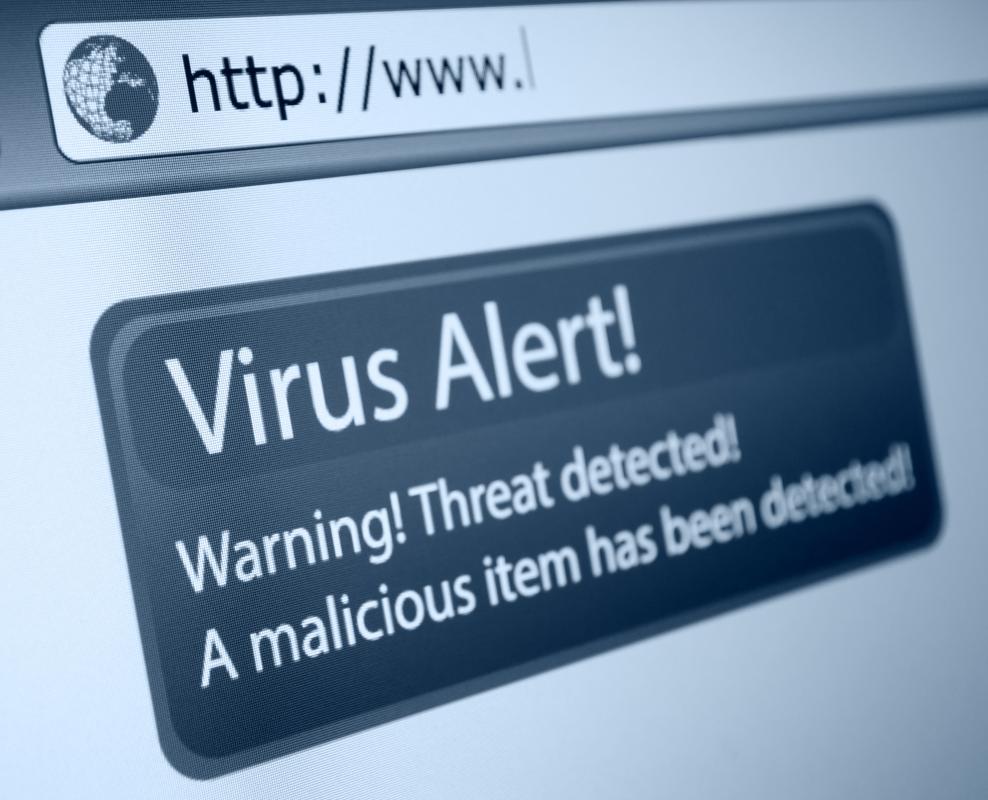At EasyTechJunkie, we're committed to delivering accurate, trustworthy information. Our expert-authored content is rigorously fact-checked and sourced from credible authorities. Discover how we uphold the highest standards in providing you with reliable knowledge.
What is a Virus Scan?
A computer virus scan is a procedure designed to identify and remove various types of threats that download to computer hard drives. First developed in the latter part of the 1980’s, the virus scan programs of today tend to identify a wide range of spyware and malware that is picked up through email attachments as well as visits to various web sites. The main objective of any virus scan is to protect the computer hard drive and any files saved on the hard drive from permanent damage.
Virus scans are beneficial in both work and home settings. Because of the proliferation of various types of online security threats, it is not unusual for manufacturers of laptop and desktop computers to include trial versions of highly regarded antivirus scan software. Typically, the buyer can activate and use the software for a limited period of time to protect the system from infection. Most of these software packages will scan the entire hard drive for threats, checking data files, program files and even computer registries for any foreign code and program downloads.

Along with fee-based virus scan programs, there are also a number of highly regarded free antivirus protection programs available today. In some cases, the free version is an introductory product to a fee based product that offers a wide range of protection. However, some virus scan software is developed and distributed by companies who produce other types of software and function as a means of earning the trust of consumers who later buy their other software offerings.

As part of the marketing effort, many virus scan programs offer a free scan to interested consumers. The online virus scan will utilize a connection to the Internet to remotely conduct a scan of the system hard drive. Upon completion, the remote scan is published to the potential consumer along with the ability to purchase and download the software to remove all the infections found on the hard drive.

It is important to note that many of the free programs today are just as effective as the fee-based programs. Often, they offer ongoing monitoring of the system, including checking inbound and outbound emails and attachments for bugs or warning the user if a given web site poses a potential threat. These no-cost programs usually offer the same level of protection from Trojans, tracking software, worms, and rootkits that can be obtained with virus scan programs that are available for a one time charge or annual renewal fee. Some of the free programs make it possible to schedule scans on a recurring basis, while others require that the user initiate a manual scan for virus activity.

In general, virus scanner software is relatively inexpensive. Both single and multiple user packages are available, making it possible to protect computers in both home and office environments. Generally, it is a good idea to check out any virus scan package by looking for online ratings and reviews before downloading any type of virus scan program.
AS FEATURED ON:
AS FEATURED ON:














Discussion Comments
@Logicfest -- have you looked at any of those scanners that update in real time? Those take advantage of cloud storage to constantly check for updates. I don't know how well those cloud-based packages work, but those have the potential of dealing with the problem of having outdated virus definitions.
Of course, those require a constant Internet connection to work right, but so what? If you're not connected to the Internet, you'll not get in trouble by downloading a virus, will you?
Do your research before getting antivirus software. That is one of the most important applications you can install on your computer because a good one can prevent you a lot of trouble down the road.
Here are some things to look for. You need to get one that updates its virus definitions regularly (daily is preferred) and downloads and installs new updates as soon as they are available. There are new viruses and spyware programs showing up on a daily basis, so outdated virus definitions can leave you vulnerable.
Also, make sure to get one that scans in real time -- one that checks files as you encounter them on the Internet. That is an intensive program, so you want to be certain you get one that is fairly lightweight and can go through that scanning process quickly. Having a scanner that slows down your system too much is one you will be tempted to switch off and that defeats the purpose of having a scanner.
Post your comments